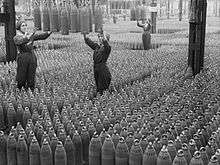Canary girls
The canary girls were the United Kingdom's female trinitrotoluene (TNT) shell makers of World War I (1914–1918). The nickname arose because exposure to TNT is toxic, and repeated exposure can turn the skin an orange-yellow colour reminiscent of the plumage of a bird, the canary (which itself was used by miners to detect toxic carbon monoxide in coal mines.)[1] The canary girls were also referred to by the nickname "munitionettes".

Historical context
Since most men were joining the military, women were required to fill factory jobs formerly occupied by men. The United Kingdom used slogans like 'National Service' or 'Women's Land Army' to encourage young women to join the work force. Factory conditions were often hazardous, and the women worked long hours for low pay. In addition to the skin discolouration, they also reported nausea and skin irritations. As a result, factories began improving ventilation and providing masks.[2]
See also
- Rosie the Riveter (a US general equivalent)
- Ruby Loftus Screwing a Breech Ring (another close UK equivalent)
- Rosies of the North (Canadian equivalents to Canary girls)
Further reading
- Hall, Edith. Canary Girls and Stockpots. Luton [Eng.]: WEA [i.e. Workers' Educational Association] Luton Branch, 1977. ISBN 0950556300 OCLC 4641086
References
- ↑ Rosser, Sue (2008). Women, science, and myth. ABC-CLIO. p. 502.
- ↑ BBC "WARTIME FACTORY DISASTER", January 2005.